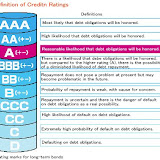The big three credit ratings agencies were threatened yesterday with fines and the creation of a new state-backed competitor, only weeks after European leaders attacked them for exacerbating Greece’s problems with downgrades. – The Times (UK)
Readers will be familiar with reactions by the Maltese administration to certain reports from particular institutions. “Audit” is the byword for a scrutiny or check that was originally applied to matters accounting but is now extended to such realms as “democratic accountability” and “freedom of press” to give but non-economic examples. The auditor is supposed to be as impartial as possible and his job is simply to report on the state of affairs – the idea being that it is up to managers, politicians and lobby groups to make do with the report as best they deem fit.
Recently we have seen an increased tendency to debate the validity of the auditor rather than the message itself. In other words, in these times of economic woes that might even effect the clear thinking of (non-economic) democratic institutions, there is a growing tendency to shoot the messenger. A concerted effort by (Commission President) Barroso and (German Chancellor and French President) Merkel & Sarkozy has recently been stepped up with the intention to undermine the credibility of a very important set of “auditors” in this day and age.

Europe’s continental leaders have targeted the three credit ratings agencies – responsible for the rating of governments and of their ability to pay their debts. The three: Standard & Poor‘s, Moody’s and Fitch (no relation to Abercrombie’s other half) have been busy downgrading Greece, Spain and Portugal’s ratings recently and were also on the verge of giving the same treatment to France. While Merkel and Sarkozy argued that the agencies need more scrutiny – a form of supervision and regulation – Barroso criticised the three for failing to alert investors on the imminent demise of Lehmann Brothers in 2008.
Barroso asks three questions:
- Is it normal to have only three relevant actors in such a sensitive issue where there is a great probability of conflict of interest?
- Is it normal that all of them come from the same country?
- Is it normal that such important entities are escaping fundamental regulation?
Now the eagerness with which the “EU that counts” shoots down the three agencies is inevitably tied to the large amount of control that they hold on the mood of the market. their ratings are not simply an auditing assessment but any move of theirs tends to have heavy repercussions on the financial and economic sectors. Shooting the messenger is only half the story.
The EU does not only intend to regulate the auditors but seems intent on creating an auditor of its own – an in-house competitor. Questions will surely be raised about the independence of such a new monster. If the current three are not above suspicion because of the possibility of conflicts of interests what then of the new monster that will be financed by the very set of sovereign nations it is supposed to vet?
Barroso’s questions begin to sound more and more like Muscat’s quickly assembled 15 point plan to battle corruption. Loads of rhetoric and flimsy legal justification. In both cases they provide little solution and comfort. Back to the drawing board José (and Joseph)
Related articles by Zemanta
- EU wants credit rating agencies regulated (telegraph.co.uk)
- Stocks Retreat, Led by Banks, as Euro Advance on Greece Bailout (businessweek.com)
- Spain Loses AAA Rating at Fitch as Europe Battles Debt Crisis (businessweek.com)
- EU calls for new rating agencies (seattletimes.nwsource.com)
- EU plans credit ratings watchdog (guardian.co.uk)
- “EU, IMF to spend 135 billion euros to bailout Greece” and related posts (stockwatch.in)
- Euro drops to lowest in 10 months (news.bbc.co.uk)
- Robert Davey: The Banks and Derivatives Trading and Senator Blanche Lincoln (huffingtonpost.com)
- Merkel’s Coalition Steps Up Calls for EU ‘Orderly Insolvencies’ (businessweek.com)
- Angela Merkel calls for tough regulation on banks (telegraph.co.uk)
- Audit regulation should be global: IOSCO (accountancyage.com)
- FCIC Testimony: Credit Rating Agency Execs Say They Couldn’t Say No To Wall Street (huffingtonpost.com)
- Damien Hoffman: Are Ratings Agencies Protecting the UK and US Like They Did With Mortgage Debt? (huffingtonpost.com)
- Credit-Rating Firms Face Single Regulator Under EU Proposals (businessweek.com)
- Credit-Ratings Firms Face Single EU Market Regulator (Update3) (businessweek.com)
![Reblog this post [with Zemanta]](http://img.zemanta.com/reblog_e.png?x-id=fb77a219-6093-4f19-8998-28d2e11cd7a5)
